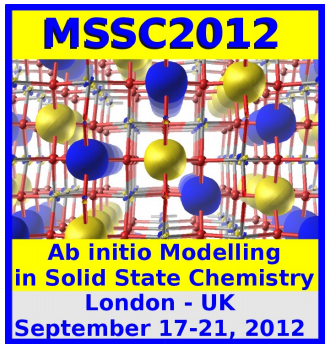MSSC2012 Ab initio Modelling in Solid State Chemistry
Discovering quantum-mechanical simulations with CRYSTAL
London (UK), September 17-21, 2012
Directors: N.M. Harrison - G. Mallia
The Department of Chemistry and the Thomas Young Centre of Imperial College London, and the Computational Materials Science Group of the Science and Technology Facilities Council are organizing the MSSC Summer School on the ab initio modelling of crystalline and defective solids. The week long school is designed for new users of CRYSTAL09; PhD students, Post-Docs and researchers with interests in solid state chemistry, physics, materials science, surface science, catalysis, magnetism and nano-science. It provides an introduction to the capabilities of quantum mechanical simulation and to the practical use of CRYSTAL (http://www.crystal.unito.it). Outline
Outline− Basic ingredients in solid state calculations: space groups and point symmetry; reciprocal space and Bloch functions; Hamiltonians (including hybrid density functionals); basis sets.
− The structure of the CRYSTAL code: selection of the basis set and Hamiltonian; controlling accuracy and numerical precision.
− Parallel and Massive Parallel execution – exploiting high performance computers.
− Total energy and related quantities: equations of state, solid state reactions, phase transitions.
− Geometry optimization: strategies and techniques. Transition state search.
− Vibrational frequencies in solids: lattice dynamics and thermodynamics.
− One electron properties: electronic structure, charge, potentials and spin densities.
− Surface chemistry and heterogeneous catalysis: models, accuracy and limitations.
− Local defects in solids: the observables of interest; the possible strategies.
− Dielectric properties from CPHF and DFPT.
− Magnetism and properties associated with unpaired electrons.
− Localized crystalline orbitals - Wannier Functions.
− Electron transport.
− Optical spectra from time dependent density functional theory.
Program
The school will last five days (17-21 September 2012) and will be held at the Chemistry Department at Imperial College London. The course is self-contained with the morning lectures providing the theoretical and computational background required for the afternoon practical sessions. Basic and Advanced tutorial levels will be available. By the end of the week an
attentive delegate will be equipped to perform reliable calculations of material properties. There will be the possibility to present posters that will be discussed during a special session.
Participation is limited to 50 people (~35 for basics and ~15 for advanced tutorials) and will be selected from applications received by the deadline. Four registration fees are in operation: £110 for registration only and £390 for registration plus five nights (check in 16 and check out 21 September) accommodation at Beit Hall. After Sunday 1 July fees will rise to £150 and £450. A small number of bursaries will be available.
Lecturers
The local staff of the Computational Materials Science Group will be joined by international experts from the University of Torino (Italy), STFC Daresbury and Rutherford Appleton Laboratories (UK), University College London (UK), University of Kent (UK) and University of Modena (Italy).
Deadlines and Contact Information
The deadline for bursary applications is Friday 1 June 2012. The bursary applicants will be notified of the outcome of the selection process by email during the week commencing 11 June 2012.
The deadline for payment of early bird fees is Sunday 1 July 2012.
E-mail : damian [dot] jones [at] stfc [dot] ac [dot] uk
Tel: +44 (0)1925 603805
Please find more iformation at http://www.cse.scitech.ac.uk/events/MSSC2012
Sponsors:

